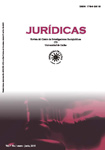Authors
Abstract
Donation, as an act of generosity, causes the separation of the goods belonging to the donor`s patrimony who, at first, may donate whatever he/she wants to whomever he/she wishes but respecting the mandatory proportions of his/her legitimate or especially protected heirs to avoid future lawsuits after his/her death because of an “ius congens” norm which the legal ordinance envisage in legitimate and legitimizer grounds. Historically and through the years, doctrine and jurisprudence have valued the effects produced when, once the donation has been arranged fulfilling all formalities demanded so that it has total legal validity, it is subsequently declared inofficious and as a consequence, reducible or “rescindable”, placing the grantee in a disadvantageous situation and in legal insecurity because the title held until that moment ends up being defective from the inofficious declaration. Thus the right to property that he/she had on the good or the donated item becomes easily broken. Being this the case, the authors of this work make a doctrinal and legislative characterization about the topic and, as a consequence, it is assessed under other countries legal orders, making special reference to the Cuban case which is not excluded from such situation. The position taken in this article does not intend to establish a school of thought to the detriment of the specially protected heir in Cuba, but to reflect and evaluate before the legal association, the position of the grantee of a house in our country facing the peculiarities present in the session of property in native soil, which constitutes the center of this work.
References
ALBALADEJO, Manuel. (1975). Derecho Civil II. Derecho de Obligaciones. 2 ed. Madird: Librería Bosch. Vol. II.
BORDA, Guillermo A. (1994). Tratado de Derecho Civil. Sucesiones. Buenos Aires: Abeledo Perrot. Tomo I.
CANABELLAS, Guillermo. (1942). Diccionario de Derecho Usual. Buenos Aires: Atalaya, Arengreen.
CAMUS FERNÁNDEZ, Emilio. (1942). Curso de Derecho Romano. Derecho Sucesorio IV. 2 ed. Universidad de La Habana.
CASTÁN TOBEÑAS, José. (1952). Derecho Civil Español Común y Foral. Derecho de Obligaciones. 7 ed. Madrid: Editorial Reus. Tomo IV.
CASTILLO FREYRE, Mario. (2005). Tratado de los Contratos Típicos SuministroDonación. Lima: Biblioteca para leer el Código Civil. Pontificia Universidad Católica del Perú. Vol. XIX, Tomo I.
COLIN, Ambrosio & CAPITANT, Henry. (1928). Curso Elemental de Derecho Civil. Madrid: Reus. Tomo VIII.
DÁVALOS FERNÁNDEZ, Rodolfo. (2003). La nueva Ley General de la Vivienda. La Habana: Editorial Félix Varela.
DE CASTRO Y BRAVO, Federico. (1985). El negocio jurídico. Madrid: Editorial Civitas.
“De nuevo sobre la nulidad instrumental. Ahora desde la perspectiva que ofrece la Sala de lo Civil y de lo Administrativo del Tribunal Supremo”. (2005). Revista Jurídica, No. 12, del MINJUS.
DÍEZ-PICAZO, Luís & GULLÓN, Antonio. (1999). Sistema de Derecho Civil. 6 ed. Madrid. Técnos. Vol. II y IV.
FERNÁNDEZ MARTELL, José K. & VÁZQUEZ PÉREZ, Arsul J. (2009). La Donación inoficiosa. ¿Quimera o Belerofonte en el Derecho positivo cubano? En: III Jornada Internacional de Derecho Civil, Familia, Agrario y Notarial. Santiago de Cuba, febrero 24 al 26 (CD en edición).
LASARTE ÁLVAREZ, Carlos. (1994). Principios de Derecho Civil. Contratos. Madrid: Editorial Trivium. Tomo III.
LÓPEZ DE ZAVALÍA, Fernando. J. (2000). Teoría de los Contratos. Ed. Buenos Aires. Tomo II.
MALLOL-ORTI. (1950). Diccionario jurídico-legislativo. 2 ed. Valencia.
MARTÍNEZ ESCOBAR, Manuel. (1949). Sucesiones Testadas e Intestadas. La Habana: Cultural. Tomo II.
OJEDA RODRÍGUEZ, Nancy & DELGADO VERGARA, Teresa. (2002). Teoría General de las obligaciones. Comentarios al Código Civil cubano. La Habana: Editorial Félix Varela.
OJEDA RODRÍGUEZ, Nancy et al. (2003). Derecho de Contratos. Teoría general del contrato. La Habana: Editorial Félix Varela. Tomo I.
PÉREZ GALLARDO, Leonardo B. (2005). “De nuevo sobre la nulidad instrumental. Ahora desde la perspectiva que ofrece la Sala de lo Civil y de lo Administrativo del Tribunal Supremo”. Revista Jurídica, Año 6, No. 12.
________. (2006). Compilación de Derecho de Sucesiones. La Habana: Editorial MINJUS. Vols. I y II.
________. (2007). Código Civil anotado y concordado. La Habana, Cuba: Ediciones ONBC, Colección De Iuris.
PÉREZ GALLARDO, Leonardo B. & COBAS COBIELLA, María Elena. (1999). Temas de Derecho Sucesorio cubano. La Habana: Editorial Félix Varela.
PÉREZ GALLARDO, Leonardo B. et al. (2004). Derecho de Sucesiones. La Habana: Editorial Félix Varela. Tomos II y III.
PÉREZ GALLARDO, Leonardo B.; ALMAGUER MONTERO, Julliett & OJEDA
RODRÍGUEZ, Nancy de la C. (2007). Compilación de Derecho Notarial. La Habana: Editorial Félix Varela.
RIVAS MARTÍNEZ, Juan José. (1992). Derecho de Sucesiones. Común y Foral. 2 ed. Madrid: Dikynson. Tomo II.
VÉLEZ TORRES, José Ramón. (1990). Curso de Derecho Civil. Derecho de Contratos. Revista Jurídica de la Universidad Interamericana de Puerto Rico, Tomo IV, Vol. II. Facultad de Derecho de San Juan.
VOLTERRA, Eduardo. (1991). Instituciones de Derecho Privado Romano. Editorial Civitas.
WAJNTRAUB, Javier H. et al. (2001). Instituciones de Derecho Privado Moderno. Buenos Aires: Editorial Lexis Nexis, Abeledo-Perrot.
ZANNONI, Eduardo. (1999). Manual de Derecho de las Sucesiones. 4 ed. Buenos Aires: Astrea.
Fuentes legales
Código Civil de la República de Argentina de 25 de septiembre de 1869.
Código Civil del Reino de España del 6 de octubre de 1888.
Ley de Procedimiento Civil, Administrativo y Laboral de la República de Cuba, Ley No. 7 del 19 de Agosto de 1977.
Código Civil de la República de Bolivia, Decreto-Ley No. 12760 de 6 de agosto de 1975.
Código Civil de la República del Perú, promulgado por Decreto Legislativo No. 295 del 24 de junio de 1984, en vigor desde el 14 de noviembre de 1984.
Código Civil de la República de Cuba, Ley No. 59 de 16 de abril de 1988.
Ley General de la Vivienda de la República de Cuba, Ley No. 65 de 23 de diciembre de 1988.
Resolución No. 14 de 13 de enero del 2006: Reglamento complementario al Decreto-Ley No. 233, que modifica artículos de la Ley General de la Vivienda. Ley No.65/88.
Decreto-Ley No. 241, en Gaceta Oficial Extraordinaria No. 33 de 27 de septiembre de 2006, Modificativa de la Ley de Procedimiento Civil, Administrativo y Laboral.

 PDF (Español)
PDF (Español)
 FLIP
FLIP






















